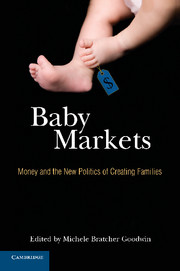Book contents
- Frontmatter
- Contents
- Preface
- Acknowledgments
- Introduction
- PART ONE WHAT MAKES A MARKET? EFFICIENCY, ACCOUNTABILITY, AND RELIABILITY OR GETTING THE BABIES WE WANT
- 1 Baby Markets
- 2 The Upside of Baby Markets
- 3 Price and Pretense in the Baby Market
- 4 Bringing Feminist Fundamentalism to U.S. Baby Markets
- 5 Producing Kinship through the Marketplaces of Transnational Adoption
- PART TWO SPACE AND PLACE: REPRODUCING AND REFRAMING SOCIAL NORMS OF RACE, CLASS, GENDER, AND OTHERNESS
- PART THREE SPECTRUMS AND DISCOURSES: RIGHTS, REGULATIONS, AND CHOICE
- PART FOUR THE ETHICS OF BABY AND EMBRYO MARKETS
- PART FIVE TENUOUS GROUNDS AND BABY TABOOS
- Author Bios
- Index
- References
5 - Producing Kinship through the Marketplaces of Transnational Adoption
Published online by Cambridge University Press: 05 August 2012
- Frontmatter
- Contents
- Preface
- Acknowledgments
- Introduction
- PART ONE WHAT MAKES A MARKET? EFFICIENCY, ACCOUNTABILITY, AND RELIABILITY OR GETTING THE BABIES WE WANT
- 1 Baby Markets
- 2 The Upside of Baby Markets
- 3 Price and Pretense in the Baby Market
- 4 Bringing Feminist Fundamentalism to U.S. Baby Markets
- 5 Producing Kinship through the Marketplaces of Transnational Adoption
- PART TWO SPACE AND PLACE: REPRODUCING AND REFRAMING SOCIAL NORMS OF RACE, CLASS, GENDER, AND OTHERNESS
- PART THREE SPECTRUMS AND DISCOURSES: RIGHTS, REGULATIONS, AND CHOICE
- PART FOUR THE ETHICS OF BABY AND EMBRYO MARKETS
- PART FIVE TENUOUS GROUNDS AND BABY TABOOS
- Author Bios
- Index
- References
Summary
You shoulda gone to China. You know, ‘cause I hear they give away babies like free iPods. You know, they pretty much just put them in those t-shirt guns and shoot them out at sporting events.
– from Juno (Fox Searchlight, 2007)Sara: What if you'd grown up in the orphanage? What do you think your life would be like?
Lani: A lot different still because being in an orphanage, people would be wanting to [adopt other kids] and so then you would be like “OK, no one is ever going to buy me.”
Sara: Oh, ha-ha [light laugh]. It's interesting that you used the word buy. Do you feel like your mom and dad bought you?
Lani: No, but they adopted me and it's sort of like buying. … My mom and dad, my mom and dad had to sign all these forms and so then it's like they're going to be paying for it, so it's like … [comically mimics rapid, panicked breathing].
– excerpt from a 2003 interview with Lani, an eight-year-old girl adopted from ChinaJuno and Lani have something in common: they dare to breach the narrow zone that buffers adoptive kinship formation from crass, globalized market forces. They remind us that whether conceived as freely accessible or prohibitively expensive, adoption might run the risk of constructing children as commodities. Responses to their respective comments corroborate that crossing this line is precarious and risky.
- Type
- Chapter
- Information
- Baby MarketsMoney and the New Politics of Creating Families, pp. 69 - 83Publisher: Cambridge University PressPrint publication year: 2010
References
- 3
- Cited by



